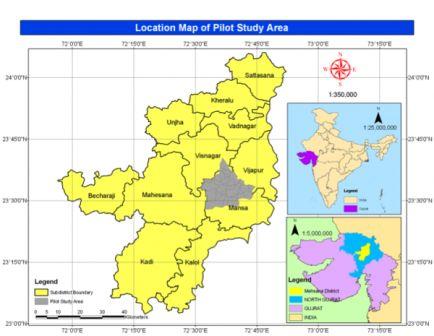Finding Groundwater
Groundwater and artificial recharge investigations around proposed site of the Devi Ratn Hotel, Ballupura, Jaipur, Rajasthan - A report by Green Systems
Posted on 22 Apr, 2011 11:57 AMThe proposal is an in-depth study of the geo-morphological setup of the area; there are also findings on geology and hydrology and the area's climate and rainfall and groundwater resources.
Groundwater and artificial recharge investigations, at the site of the Devi Rasa Boutique Hotel in Amer, Rajasthan - A report by Green Systems
Posted on 22 Apr, 2011 11:43 AMThe consultants, Green Systems, have conducted an indepth study of various parameters which include hydro-geology and climatic conditions to come up with a set of proposals for the hotel. To come up with their suggestions the consultants also make use of technologies like remote sensing, GIS and Vertical Electrical Sounding (VES).
Groundwater assessment using remote sensing data - A case study of the Bhadra river basin - Paper presented at the National Seminar on Water and Culture (2007)
Posted on 13 Feb, 2011 11:21 PMThis method is a mathematical model, in which all the components in the water balance equation are known, and the only component which is considered unknown is the rainfall recharge.
Groundwater flow modelling and aquifer vulnerability assessment in Yamuna–Krishni sub-basin of Muzaffarnagar district – A study by Central Ground Water Board and Aligarh Muslim University
Posted on 02 Feb, 2011 08:24 AMThis report by Aligarh Muslim University and Central Ground Water Board (CGWB) deals with groundwater flow modelling and aquifer vulnerability assessment in Yamuna–Krishni sub-basin of Muzaffarnagar district. For evaluation of the groundwater resources and for minimizing the error of estimation, the system has been evaluated through aquifer modelling where water balance is established using partial differential equation of groundwater flow and is solved with boundary and initial boundary conditions.
India’s groundwater challenge and the way forward - Economic and Political Weekly
Posted on 20 Jan, 2011 07:01 PMIt warns that groundwater quantity as well as quality are the two major problems that the country has been facing.
The rate of withdrawal of groundwater has reached “unsafe” levels in 31% of the districts, covering 33% of the land area and 35% of the population. The situation has dramatically worsened within a short span of nine years, between the assessments done in 1995 and 2004.
Taking the quantitative and qualitative aspects together, data indicates that a total of 347 districts (59% of all districts in India) are vulnerable in terms of safe drinking water in India. This is a matter of serious concern, requiring a new approach.
The worsening water crisis in Gujarat - The Earth Institute
Posted on 20 Jan, 2011 04:41 PMIt was the kick-off event of an ambitious project to find solutions to the groundwater crisis in Gujarat, funded by the PepsiCo Foundation. More details of the project will follow this overview post.
 Gujarat and the Mehsana region, India Source: Columbia Water Center
Gujarat and the Mehsana region, India Source: Columbia Water Center
Understanding groundwater - A course by ACWADAM
Posted on 20 Dec, 2010 01:01 AMThe Advanced Centre for Water Resources Development and Management (ACWADAM) has created a power-point course to explain the formation of groundwater and its management.
The course consists of 6 modules; it includes the basics of understanding groundwater, study of geology, groundwater level and movement, planning and management of groundwater, storage and flow of groundwater and water quality. The modules have been made into succinct power-point presentations that include charts, diagrams and photographs besides the written word.
Mining - An increasing threat to our rivers - Article by Nitya Jacob
Posted on 20 Dec, 2010 12:29 AMContent Courtesy: Solution Exchange and Nitya Jacob
Author: Nitya Jacob
India’s arteries are choking. Her rivers, the lifeline of hundreds of millions, are over-taxed, polluted and encroached. They are being mined, dammed and emptied of water. Save for the four monsoon months, most rivers are streams of drains, depending on how many cities they pass through. This year people gaped in awe at the River Yamuna (I am sure they were over-awed by other rivers elsewhere too) as for the first time since 1978 looked like a river and not a drain.
An illustrated collection of groundwater problems: A guide to a beginner in groundwater hydrology by CAREWATER
Posted on 18 Oct, 2010 07:53 PMThis report by CAREWATER has been prepared as part of a component on Groundwater Governance in Asia: Theory and Practice under the CGIAR Challenge Programme on Water and Food. The purpose of this collection is to guide a beginner to groundwater hydrology through the basic concepts in this subject. The problems begin with fundamentals of the subject and are followed by those which test the comprehensiveness of understanding. Most problems are illustrated and a real-world situation is related with the problem.
Training modules on planning, development and management of groundwater with special reference to watershed management programmes by ACWADAM
Posted on 06 Oct, 2010 08:12 PM
Advanced Center for Water Resources Development and Management (ACWADAM) is a premier education and research institution and facilitates work on groundwater management through action research programmes and trainings. ACWADAM’s main thrust has been on the process of capacity building and facilitation, both founded strongly on its research base.
ACWADAM, with support from the Ford Foundation, has embarked on strengthening civil society capabilities in groundwater management, using the watershed management platform. A comprehensive training module on basic hydrogeology and groundwater science, has been developed, and can be sourced by writing to ACWADAM at acwadam@vsnl.net.
These trainings enable the trainees particularly from Civil Society Organisations to improve the planning, implementation and monitoring of their watershed development and allied projects.





